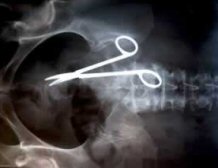- OOPS! Home
- Our Research
- Our Publications
- Frequently Asked Questions
- Quotations About Inattention
- Brief Essays on Inattention
- Contact Us
- Mailing List
Report an attention lapse
 image source
image sourceAssurance of Confidentiality
All information will be kept completely confidential, your confidentiality is preserved at all times. Information you provide will not be shared or published without your permission. More »Medical
The field of medicine is one of the attention-critical domains we have selected for study. Due to the highly demanding nature of the work and environment, as well as the long hours that are sometimes required, the medical field is an ideal place to measure both the frequency and impact of attention failures as a result of stress and sleep deprivation.
This is why we require data from medical professionals; the better we understand what causes attention failures, the more able we will be to minimize their effects in the practice of medicine.
There have been very few studies in the past on the topic of attention failures within the medical setting and, as such, we require the help of medical practitioners like yourself in completing our understanding.
The Costs of Inattention
Increased sleepiness among medical interns has been found to result in 35.9% more serious medical errors and 20.8% more medication errors.
Our research studies the nature of everyday attention and memory failures and how they impact our daily lives. All our research is being conducted under the supervision of Dr. Dan Smilek, Department of Psychology of the University of Waterloo, Canada.
We appreciate your interest in our research and ask that you consider participating in it. If you decide to volunteer, you can fill out as many of our attention lapse reports or other questionnaires on our research page as you wish. Most of our questionnaires require only a few minutes to complete, and your responses to our attention lapse reports can be as sparse or detailed as you wish. For most questionnaires you will be asked to answer general background questions (for example, where you live and your age) but you can choose not to answer these questions if you wish, and you can withdraw your participation at any time by simply not submitting your responses or leaving the Oops! website entirely. There are no known or anticipated risks from participating in our research.
It is important for you to know that any information that you provide will be confidential. All of the data will be summarized and no individual could be identified from these summarized results. Furthermore, the web site is programmed to collect responses on the questionnaires alone; we do not collect any information that could potentially identify you (such as machine identifiers). For additional information on how we keep your data safe, please see our Confidentiality Statement.
Our research has been reviewed and received ethics clearance through the Office of Research Ethics at the University of Waterloo. Should you have any questions about our research, or would like to receive a copy of the results of our research please contact us. If you have any concerns resulting from your participation in our research, please feel free to contact Dr. Susan Sykes, Director, Office of Research Ethics, at 1-519-888-4567 x 36005, ssykes@uwaterloo.ca. For more information on how we keep your identity safe, please review our confidentiality statement.
We understand that information on the topic of attention failures in the workplace is especially sensitive, particularly in such a safety critical field as medicine, and hope you will help us in our attempt to understand how the mind creates and sustains attention. In the process, you will be helping to reduce the costs of attention failures in the world of medicine.
Report an attention lapse
As with all research conducted at the University of Waterloo, we take care to ensure your confidentiality and the safety of your data. To view our confidentiality statement, click here.



